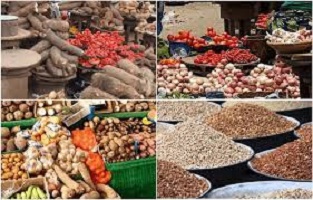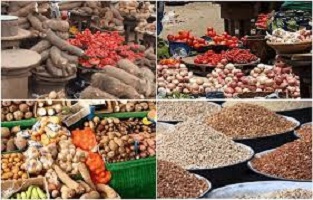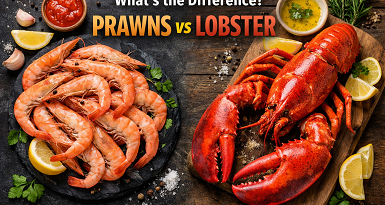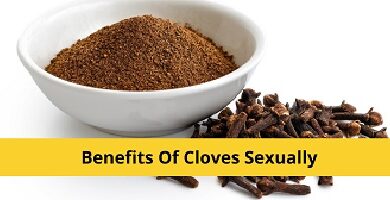Nigerian Foods Rejected Abroad~ Ogbono, Beans, Egusi & Others
Nigerian Foods Rejected Abroad~ Ogbono, Beans, Egusi & Others. This list is subject to modification at any time. According to the national agency for Food and drug administration and Control (NAFDAC), 10 Nigerian foods and items are now being rejected abroad.

Sanwo-olu o.a., deputy director, export division, ports inspection directorate, NAFDAC, revealed some of the commonly rejected export food commodities from Nigeria from 2018 to date, and in the top 10 include sesame, beans, melon seeds, peanut, and smoked fish/fish meal, ginger, spices paper, hibiscus flower, palm oil, and ogbono
According to her, the commodities are rejected abroad due to stakeholders’ failure to follow established clearing procedures.
Nigerian Foods Rejected Abroad ~ Prohibited and restricted imports
This includes a list of commodities that are either prohibited from being shipped to the country or are restricted in some other way.
Import and export prohibited items in Nigeria
According to the national agency for Food and drug administration and Control, over 70% of Nigerian food exports are rejected abroad, resulting in significant financial losses for exporters and the country as a whole.
Prohibited items are those that are not permitted to be shipped or moved into a country. These items are prohibited from import or export.
Whether you are shipping for personal or commercial purposes, you must be aware of the commodities or products that you cannot transport from Nigeria to the united states.
From the smallest thing to the largest, US customs is quite stringent about what enters the country and will not allow any item that is prohibited into the country.
The following items are forbidden or restricted imports in Nigeria:
- Live or dead chickens, as well as frozen poultry
- Pork
- Beef
- Bird eggs (excluding hatching eggs)
- Refined vegetable oils and fats (including mayonnaise), but not refined linseed, castor, or olive oil. The importation of crude vegetable oil is not prohibited.
- Cane or beet sugar and chemically pure sucrose in retail containers with additional flavoring or coloring materials
- Cocoa butter, powder, and baked goods
- Spaghetti or noodles
- Retail packs of fruit juice
- Waters, including mineral waters and aerated waters with added sugar, sweetening substance, or flavoring; ice snow; other non-alcoholic beverages; beer and stout (bottled, canned, or otherwise packed), but not energy or health drinks
- Cement that has been bagged
- Paracetamol syrups and tablets
- Cotrimoxazole syrups and tablets
- Metronidazole syrups and tablets
- Tablets and syrups containing chloroquine
- Haematinic formulations (excluding modified released formulations); ferrous sulfate and ferrous gluconate tablets, folic acid tablets, vitamin B complex tablets
- Multivitamin tablets, capsules, and syrups (unless otherwise specified)
- Aspirin pills (except modified released formulation and soluble aspirin)
- Tablets and suspensions of magnesium trisilicate
- Piperazine syrups and tablets
- Tablets and syrups containing levamisole
- Clotrimazole ointment
- Penicillin/gentamycin ointments
- Pyrantel pamoate syrups and tablets
- Intravenous fluids (e.g., dextrose, normal saline)
- Pharmaceutical waste
- Mineral or chemical fertilizers containing two or three of the nitrogen, phosphorus, and potassium (npk 15-15-15) fertilizing ingredients, omitting organic fertilizer
- Only retail-packaged soaps and detergents
- Coils of mosquito repellent
- Rethreaded and used pneumatic tires, excluding used truck tires for rethreading 11.00 x 20 and larger.
- Corrugated paper and paper boards, as well as cartons, boxes, and containers composed of corrugated paper and paper boards, toilet paper, cleaning or facial tissue, except baby diapers and adult incontinent pads
- Phone recharging cards and vouchers
- Carpets and various types of textile floor coverings
- All sorts of footwear, backpacks, and suitcases, except oil industry safety shoes, sports shoes, canvas shoes, and all complete knockdown (CKD) blanks and components
- All types of hollow glass bottles with capacities greater than 150ml (0.15 liters) are used for beverage packaging by brewers and other beverage and drink industries
- Used compressors and refrigerators/freezers
- Used automobiles that are more than fifteen (15) years old from the year of manufacture
- Ballpoint pens and accessories, including refills (except the tip)
- Retail sale of tomato paste or concentration
Furthermore, the Nigeria customs service (ncs) has declared the following commodities “absolutely prohibited” from being imported into Nigeria:
- air rifles
- photographic printing paper for airmail
- all counterfeit/pirated materials or articles, including any country’s base or counterfeit coin
- beads made of flammable celluloid or other comparable materials.
- blank invoices
- coupons for overseas football pools or other forms of betting
- cowries
- tea that has been exhausted or tea that has been blended with other ingredients. Exhausted tea is defined as any tea that has been deprived of its proper quality, strength, or virtue through steeping, infusion, decoction, or other ways.
- cartridge reloading tools and equipment
- indecent or obscene prints, paintings, novels, cards, engravings, or other obscene articles
- manilas
- matches containing white phosphorous
- materials of any sort with a design that, in the president’s judgment, is likely to cause a disturbance of the peace or to insult the religious views of any class of individuals in Nigeria, given the purpose for which any such material is intended to be used.
- meat, vegetables, or other items deemed unfit for human consumption by a health official
- piece goods and all other textiles, including wearing garments, hardware of all types, crockery, china, or earthenware objects with inscriptions (in Roman or Arabic characters) from the koran or traditions and commentaries on the Koran
- pistols in any disguise
- vintage clothing
- silver and metal alloy coins are not legal money in Nigeria.
- toxic industrial waste and nuclear waste
- spirits containing more than 48% pure alcohol by volume, excluding denatured, medicinal, and perfumed spirits, and such other spirits as the comptroller-general, in his discretion, may authorize to be imported subject to such conditions as he may impose.
The following items are not eligible for foreign exchange at the CBN’s official window:
- rice
- concrete
- spreadable margarine
- palm kernel/palm oil derivatives/vegetable oils
- meat and meat-related items
- vegetables and vegetable-processed goods
- poultry (chicken, eggs, and turkey)
- private planes and jets
- incense from India
- tinned geisha/sardines in sauce
- steel sheets that have been cold rolled
- sheets of galvanized steel
- roofing materials
- wheelchairs
- headbands
- metal containers and boxes
- silverware
- steel barrels
- steel tubes
- wire rods (deformed and undamaged)
- reinforcing bars and iron rods
- mesh wire
- nails made of steel
- razor wire and security
- particle boards and panels made of wood
- boards and panels made of wood fiber
- plywood panels and boards
- solid wood doors
- furnishings
- toothpicks
- glasses & glassware
- cooking utensils
- dinnerware
- ceramic and vitrified tiles
- fabrics
- woven textiles
- clothing
- polypropylene granules, cellophane wrappers, plastic, and rubber products
- cosmetics and soap
- tomatoes and tomato paste
- purchases of Eurobonds/foreign currency bonds/shares
- organic fertilizer
- dairy and milk
- maize
- sugar
In 2020, the Nigerian government added milk and other dairy products to the original list of 41 items banned for foreign exchange imports.
In a partial reversal of the same prohibition, the government restricted milk and dairy product imports to six dairy enterprises accused of encouraging backward integration.
The following companies have been approved:
- Wamco friesland campina nigeria limited
- Chi limited
- Arla dairy products limited (tg arla)
- Promasidor nigeria ltd.
- Nestle Nigeria plc is a company based in Nigeria. (msk only)
- Integrated dairies ltd.
The Nigerian government has stated that by 2022, all milk imports will be prohibited, albeit no measures to enforce this appear to be in place.
In July 2021, the government restricted sugar imports to three approved companies: bua sugar refinery limited, Dangote sugar refinery plc, and golden sugar company.
Nigerian Foods Rejected Abroad ~ What are the banned foods in Nigeria?
The following items are forbidden or restricted imports in Nigeria:
- Live or dead poultry, including frozen chicken.
- Pork
- Beef
- Bird eggs (excluding hatching eggs).
- Refined vegetable oils and fats (including mayonnaise), but not refined linseed, castor, or olive oil.
Nigerian Foods Rejected Abroad ~ What items are not valid for foreign exchange in Nigeria?
Rice, cement, margarine, palm kernel, palm oil goods, vegetable oils, meat and processed meat products, vegetables, and processed vegetable products, chicken, tomatoes/tomato paste, soap and cosmetics, and clothing are among the things affected.
What kinds of commodities are illegal in Nigeria?
Importation of strictly prohibited goods in Nigeria is
- Pistols that shoot air.
- Photographic printing paper for airmail.
- All counterfeit/pirated goods or articles, including any country’s base or counterfeit coin.
- Beads made of flammable celluloid or other comparable materials.
- Blank invoices.
What exactly are contraband goods?
Items or merchandise that are prohibited from importation, exportation, or possession.
What is the most common contraband?
Mobile phones
Cell phones, medication, razor blades, and hoarded food, particularly fruits that can be fermented to make alcohol, are the most typical sorts of contraband seized from cells, according to correctional officers.
What types of goods can be smuggled?
To evade immigration laws, some of the most profitable smuggling involves watches, cigarettes, liquor, exotic animals, and even people.
Nigerian Foods Rejected Abroad ~ What are Nigeria’s exportable goods?
Ginger, cocoa butter, rubber, palm kernel oil, textiles and garments, gallstone, sesame seed, garlic, yam tubers, charcoal, cotton, cassava flour, cashew nuts, honey, shrimp, snail, chili pepper, fruit juice, poultry, cosmetics and soap, wigs and hair attachments are among the items you can export from Nigeria.
Nigerian Foods Rejected Abroad ~ What products in Nigeria are exempt from excise duty?
Plants and machinery used in export processing zones (epzs) or free trade zones (ftzs), basic food items (based on a particular list), medical products and services, pharmaceutical products, books and educational materials, and exported services are all exempt.
Is rice import ban in Nigeria?
The Nigerian government banned the import of parboiled rice through the country’s seaports on January 20, 2022.
The notification was made by the Nigeria customs service (NCS), according to media sources.
Previously, in 2016, the government prohibited the importation of rice across land boundaries.
What items are prohibited in CBN?
Here is the list of the 43 non-eligible items banned from accessing Forex by cbn
- Rice.
- concrete.
- margarine is a type of fat.
- products derived from palm kernels/palm oil/vegetable oils.
- meat and meat-related items.
- vegetables and vegetable-processed products.
- poultry (chicken, eggs, and turkey).
- private planes and jets.
What items are not valid for foreign exchange in Nigeria?
Rice, cement, margarine, palm kernel, palm oil goods, vegetable oils, meat and processed meat products, vegetables, and processed vegetable products, chicken, tomatoes/tomato paste, soap and cosmetics, and clothing are among the things affected.
What goods are contraband in Nigeria?
Goods the importation of which is prohibited in Nigeria
- Air pistols.
- Airmail photographic printing paper.
- All counterfeit/pirated materials or articles including base or counterfeit coin of any country.
- Beads are composed of inflammable celluloid or other similar substances.
- Blank invoices.
What are the types of contraband?
Alcohol, communication devices, drugs, drug paraphernalia, tattoo equipment, guns, and other goods are examples of contraband in prisons.
Prohibited things may include everyday and seemingly innocuous items that, while not criminal, may be used inappropriately by convicts.
What are the names of contraband?
Example contraband list
- Illicit drugs.
- Prescription and non-prescription medications.
- Implements linked to drug use (eg. Syringe)
- Any form of powders.
- Offensive materials (eg. Pornographic or racist material)
- Tobacco or implements linked to tobacco use
- Chewing gum.
- Incense, potpourri, candles, oils, or diffusers.
What does it mean to be in contraband?
Other forms: contrabands. Contraband refers to “illicit goods” that are unlawfully imported or exported, such as firearms and exotic pets (such as tigers). Contra means “against” (contradict, contradictory) and bando means “ban,” so contraband simply means “against the rules” or “against a ban.”
What does the term “contraband” signify in customs?
Products that are illegal to export or import. Imported or exported illegally.
What exactly are unlawfully imported and exported goods?
Contraband goods are those that are unlawfully brought into or out of a country.
What is the term for bringing contraband items into a country?
Smuggling is the illicit movement of things, drugs, information, or people, such as out of a residence or building, into a prison, or across an international border, in violation of applicable laws or other restrictions.
Nigeria export Prohibition list ~ Prohibited items to export from Nigeria
- Rice.
- Cement.
- Margarine.
- Palm kernel/Palm oil products/vegetable oils.
- Meat and processed meat products.
- Vegetables and processed vegetable products.
- Poultry chicken, eggs, turkey.
- Private airplanes/jets.
List of banned imported goods in Nigeria ~ Nigeria’s list of prohibited or restricted imports is as follows:
- Live or dead poultry, including frozen chicken.
- Beef
- Pork
- Bird eggs (excluding hatching eggs).
- Refined vegetable oils and fats (including mayonnaise), but not refined linseed, castor, or olive oil.
List 10 banned foods in Nigeria ~ What items are banned in CBN?
Here is the list of the 43 non-eligible items banned from accessing forex by CBN
- margarine is a type of fat.
- products derived from palm kernels/palm oil/vegetable oils.
- meat and meat-related items.
- vegetables and vegetable-processed products.
- poultry (chicken, eggs, and turkey).
- private planes and jets.
List Of Contraband Goods in Nigeria 2022 ~ Goods the Importation of Which Is Prohibited in Nigeria
- Air Pistols.
- Airmail Photographic Printing Paper.
- All counterfeit/pirated materials or articles including Base or Counterfeit Coin of any Country.
- Beads are composed of inflammable celluloid or other similar substances.
- Blank invoices.
5 banned foods in Nigeria ~ Nigeria’s list of prohibited or restricted imports is as follows:
- live or dead poultry, including frozen chicken.
- pork.
- beef.
- bird eggs (excluding hatching eggs).
- refined vegetable oils and fats (including mayonnaise), but not refined linseed, castor, or olive oil.
List of exported goods in Nigeria
Export products in Nigeria, from sources across the web
- Cashew
- Ginger
- Cocoa butter
- Rubber
- Charcoal
- Cotton
- Petroleum
- Honey
- Sesame Seed
What items are not valid for foreign exchange in Nigeria?
Rice, cement, margarine, palm kernel, palm oil goods, vegetable oils, meat and processed meat products, vegetables, and processed vegetable products, chicken, tomatoes/tomato paste, soap and cosmetics, and clothing are among the things affected.



